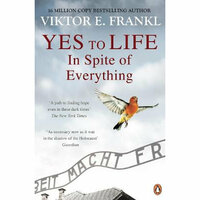Take a photo of a barcode or cover
I first heard about Frankl when a friend recommended his best selling book, Man's Search for Meaning, back in college. That being one of the most impactful books I had ever read, I knew I needed to give Yes to Life a go.
Frankl sifts through suffering, guilt, and meaning within the folds of continental Europe Post WWII. The book is approached as three separate lectures given after he was shuffled around various Nazi Concentration Camps and finally, liberated from a concentration camp near Dachau, Germany. He beautifully weaves wisdom from the likes of Kant and Neitzche with his own experience as a prisoner. He reaffirms that in spite of our circumstances, we all matter. Even creating a psychological counseling approach, logotherapy, in the process. There is meaning in the mess and a hope for our individual and collective future. Inherently enough for us all to say "Yes to Life". I believe you will find this compilation riveting, thought-provoking, and filled with little joys.
Frankl sifts through suffering, guilt, and meaning within the folds of continental Europe Post WWII. The book is approached as three separate lectures given after he was shuffled around various Nazi Concentration Camps and finally, liberated from a concentration camp near Dachau, Germany. He beautifully weaves wisdom from the likes of Kant and Neitzche with his own experience as a prisoner. He reaffirms that in spite of our circumstances, we all matter. Even creating a psychological counseling approach, logotherapy, in the process. There is meaning in the mess and a hope for our individual and collective future. Inherently enough for us all to say "Yes to Life". I believe you will find this compilation riveting, thought-provoking, and filled with little joys.
Ein etwas anderer Erfahrungsbericht. Voktor Frankl ist Psychologe und als solcher betrachtet er rückwirkend seine Erlebnisse während des Holcausts. Er erinnert an seine Zeit im Konzentrationslager und dies nicht nur als Erfahrungsbericht, sondern auch als Analyse, warum hat er und auch seine Mithäftlinge sich so verhalten, was sie tun mussten, um diese Hölle zu überleben und was das mit ihnen gemacht hat.
Ein wichtiges Buch gegen das Vergessen.
Ein wichtiges Buch gegen das Vergessen.
I didn't find this book as engaging as A Man's Search for Meaning. It's well written but I found his arguments fallible.
Overall a decent read, but not as inspiring A Man's Search for Meaning
Overall a decent read, but not as inspiring A Man's Search for Meaning
challenging
emotional
hopeful
informative
inspiring
reflective
medium-paced
emotional
informative
inspiring
reflective
medium-paced
hopeful
informative
inspiring
reflective
medium-paced
Keep remembering what's worth living for. There's meaning in the struggles and joys of life.
Food for thought. I think the second and third section applies well to current events. I agree with Frankl's assertation that it's the believing in life and continuing to say "Yes!" regardless of circumstance that gives humans the ability to survive and endure.
This is the first English translation of three talks that Viktor Frankl gave after his release from a concentration camp, post WWII. He speaks of a community of camp survivors who, after their ordeal, chose to celebrate life in every way they could--to say yes to life, in spite of everything they had lost and endured. Frankl and some of his fellow survivors found meaning in life through creating that meaning; that is, they focused on finding meaning in their work, in art, nature and music and by committing to adapting to whatever circumstance's life or fate threw their way. They did not let themselves become disenchanted with life for that leads to a sense of meaningless and despair.
Frankl believed that even in dire circumstances, such as being interned in a concentration camp, we retain the freedom to adapt to our environment. We can choose to suppress our negativity and to have hope for the future. Life is the question and the action we take to make life meaningful is the answer. And those actions and answers (whether we choose to make them positive or negative) will radiate out into the world after we are gone.
Frankl believed that even in dire circumstances, such as being interned in a concentration camp, we retain the freedom to adapt to our environment. We can choose to suppress our negativity and to have hope for the future. Life is the question and the action we take to make life meaningful is the answer. And those actions and answers (whether we choose to make them positive or negative) will radiate out into the world after we are gone.
Trigger warning: SUICIDE, possible toxic positivity
Warning: You should probably read this when you are susceptible to the idea that life is worth living. Otherwise you might catch yourself rolling your eyes or not finishing the book. Either my perspective changed, or the ending got better, but it became worth it. Possibly a bit dated, but less than you'd imagine.
Read if you are looking for a pull-yourself-up-by-the-bootstraps perspective from someone who lived through serious trials. He also lists a couple things people can do to find their purpose and want to live.
Warning: You should probably read this when you are susceptible to the idea that life is worth living. Otherwise you might catch yourself rolling your eyes or not finishing the book. Either my perspective changed, or the ending got better, but it became worth it. Possibly a bit dated, but less than you'd imagine.
Read if you are looking for a pull-yourself-up-by-the-bootstraps perspective from someone who lived through serious trials. He also lists a couple things people can do to find their purpose and want to live.



